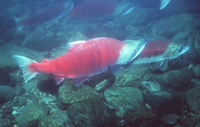NOAA’s Fisheries Service Publishes Draft Recovery Plan for Washington’s Lake Ozette Sockeye Salmon
April 25, 2008

Sockeye salmon.
High Resolution (Credit: NOAA)
NOAA’s Fisheries Service, the federal agency charged with protecting northwest salmon listed under the Endangered Species Act, has published and is seeking public comment on a proposed plan to recover threatened sockeye salmon in Lake Ozette, its shore, tributaries and the Ozette River. The plan took two years to develop with input from local citizens and landowners. Recovery plans are a requirement for species listed under the ESA.
The 7,550-acre lake, in Washington’s Olympic National Park on the Olympic Peninsula, is the state’s third largest. Lake Ozette sockeye salmon were listed as threatened under the ESA in 1999.
The Lake Ozette sockeye proposed plan is part of a larger commitment made by NOAA’s Fisheries Service to develop salmon recovery plans throughout the region. Elements of more than 60 subbasin and watershed plans from all across the northwest are being incorporated into larger regional recovery plans for salmon and steelhead in the interior Columbia basin, the Snake River basin, the Oregon coast and Puget Sound areas. Three of these plans and part of a fourth have already been completed and are now being implemented.
The goal of the plan in part is for naturally spawning Lake Ozette sockeye that are sufficiently abundant, productive, and diverse to provide significant ecological, cultural, social and economic benefits. The plan looks toward rebuilding Lake Ozette sockeye to levels that will provide ecological, cultural, social, and economic benefits. The proposed recovery plan is a roadmap and resource for people and organizations willing to take action to help recover sockeye. It provides a range of recovery actions that address the factors affecting sockeye at all stages of its life cycle.
The plan has objective, measurable criteria that if met, would lead to having these sockeye removed from the Endangered Species list, and include standards of abundance, productivity, distribution and diversity.
The proposed plan was produced over two years by NOAA’s Fisheries Service with the active participation of the Lake Ozette Steering Committee, a group made up of local citizens, landowners, forest managers, biologists and representatives of several county, state, tribal and federal entities, and the Washington governor’s salmon recovery office. NOAA Fisheries Service’s Puget Sound technical recovery team developed the population and biological goals that are the technical basis for the proposed plan.
The agency said it would set a schedule of public workshops in Port Angeles and Sekiu, Wash., over the next several weeks to discuss the draft. A final recovery plan could come as early as the end of this year.
Locally generated recovery plans for other listed salmon populations in the northwest are expected this year and next.
Visit the Lake Ozette ESA Salmon Recovery Planning Web site for the proposed plan and related documents.
NOAA is dedicated to enhancing economic security and national safety through the prediction and research of weather and climate-related events and information service delivery for transportation, and by providing environmental stewardship of our nation's coastal and marine resources. Through the emerging Global Earth Observation System of Systems (GEOSS), NOAA is working with its federal partners, more than 70 countries and the European Commission to develop a global monitoring network that is as integrated as the planet it observes, predicts and protects.
NOAA’s Fisheries Service is dedicated to protecting and preserving our nation’s living marine resources and their habitat through scientific research, management and enforcement. NOAA Fisheries Service provides effective stewardship of these resources for the benefit of the nation, supporting coastal communities that depend upon them, and helping to provide safe and healthy seafood to consumers and recreational opportunities for the American public.
